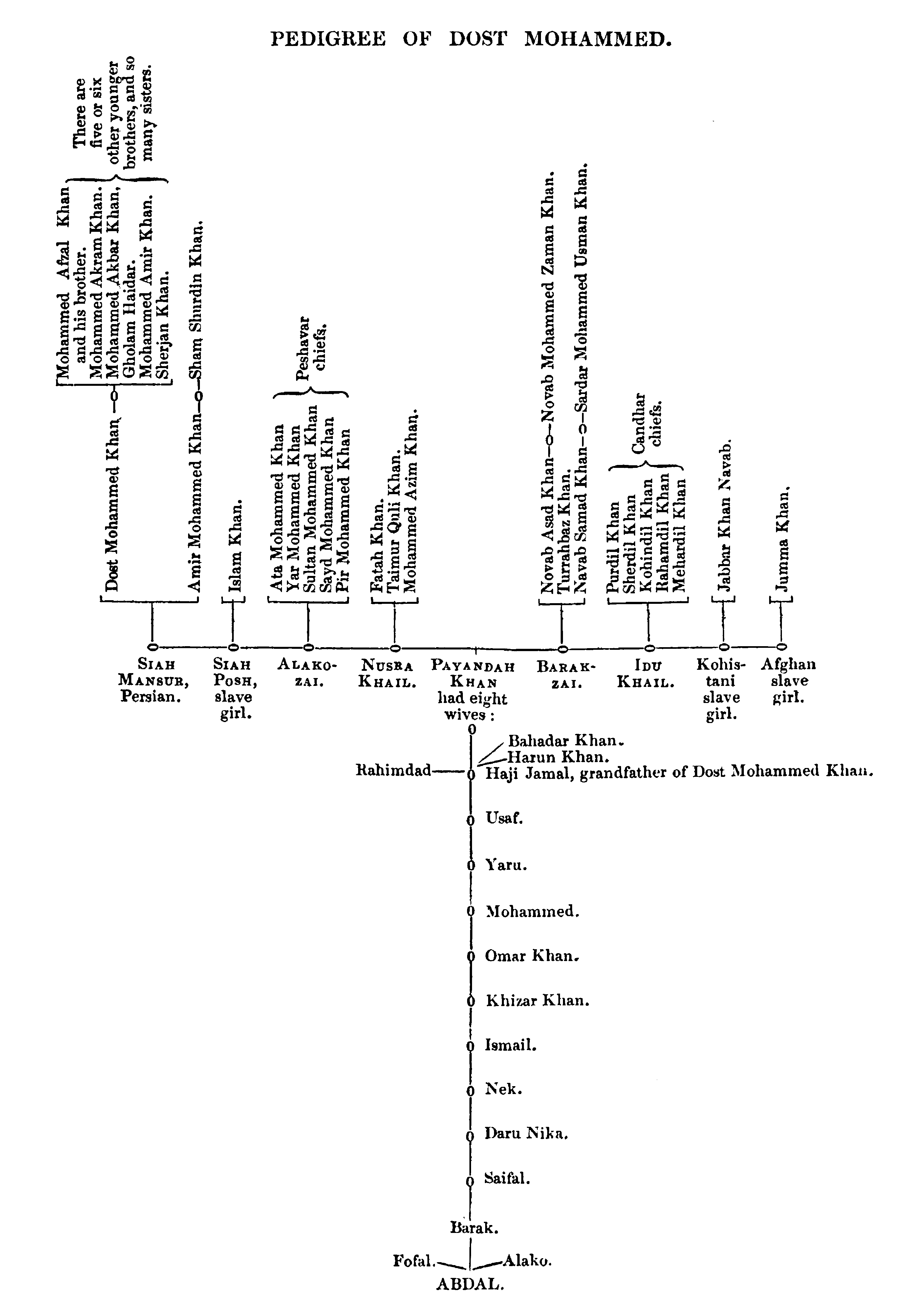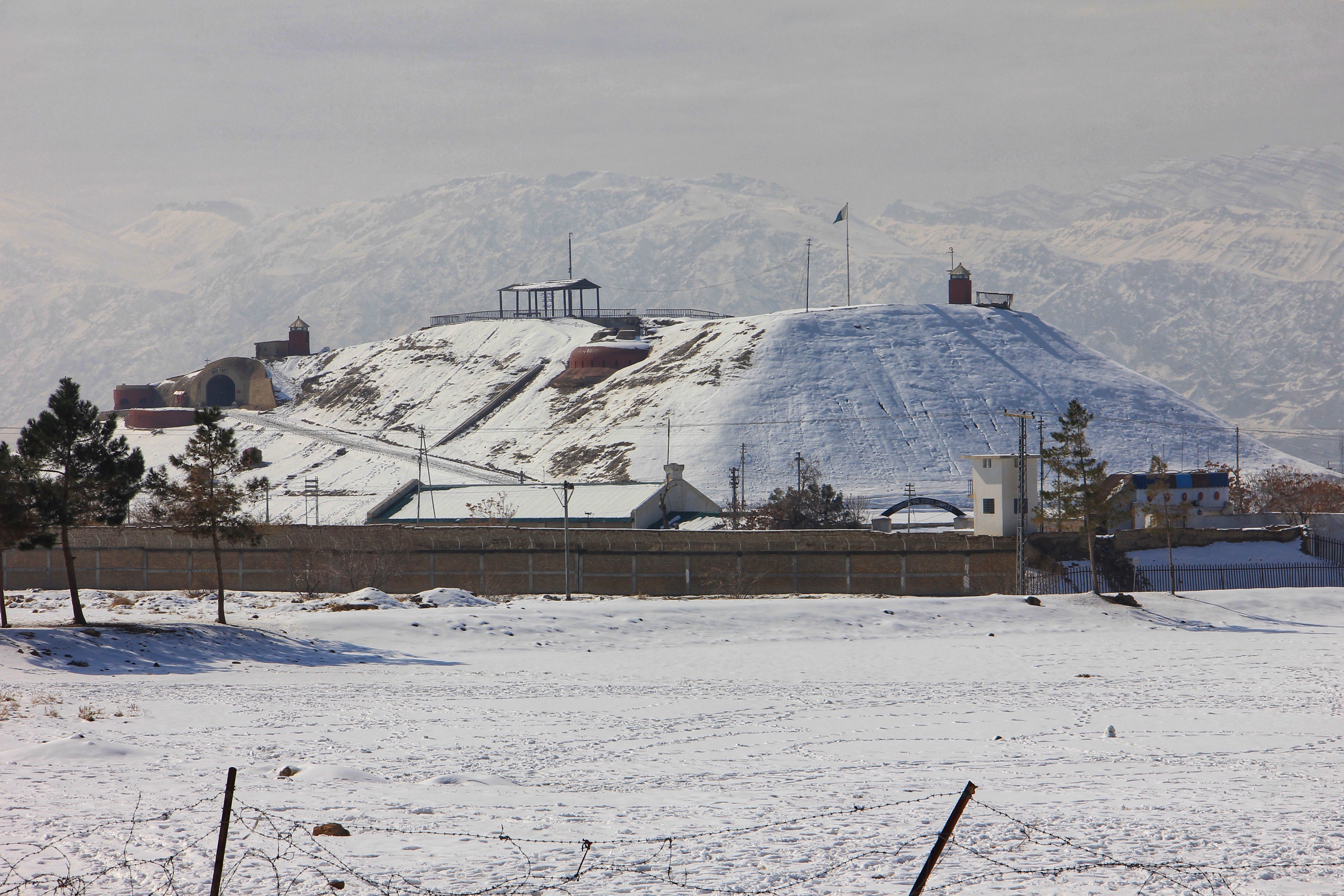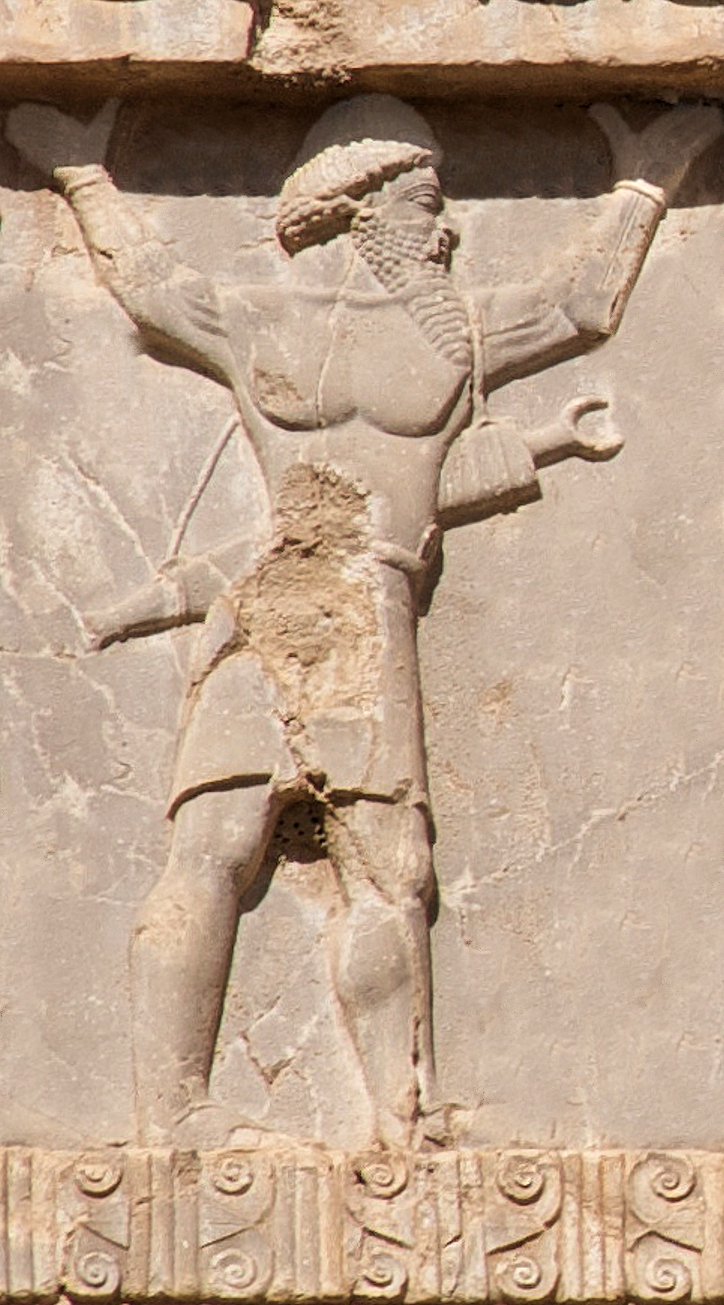|
Popalzai
Popalzai or Popalzay ( ps, پوپلزی), also known as Popal, are Durrani (formerly called Abdali or Bor Tareen) Pashtuns of Afghanistan. The Popalzai are part of the Zirak confederation of Pashtun tribes. The origin of the Abdali forefathers of the Sadozai tribe is probably the Hephthalites. The forefathers of Ahmad Shāh Durrānī, the founder of the Durrani Empire, were from the Sadozai tribe which is a subtribe of the Popalzai. According to Mohan Lal, the Zirak line begins with Sulaiman Zirak Khan, who was the father of Popalzai, Barakzai, and Alakozai. The tribe's origin is Kandahar, Afghanistan. The majority of the Popalzai live in the southern areas of Afghanistan such as in Kandahar, Helmand or Uruzgan. A small number of Popalzais and Sadozais live in Pakistan, particularly in the cities of Quetta, Bannu, Dera Ismail Khan, Sudhanoti District, Poonch, In Azad Kashmir, Sadhan is known as Sadozai, a branch of the Popalzai tribe. Peshawar and Multan. Some members of ... [...More Info...] [...Related Items...] OR: [Wikipedia] [Google] [Baidu] |
Hamid Karzai
Hamid Karzai (; Pashto/ fa, حامد کرزی, , ; born 24 December 1957) is an Afghan statesman who served as the fourth president of Afghanistan from July 2002 to September 2014, including as the first elected president of the Islamic Republic of Afghanistan from December 2004 to September 2014. He previously served as Chairman of the Afghan Interim Administration from December 2001 to July 2002. He is the chief (''khān'') of the Popalzai Durrani tribe of Pashtuns in Kandahar Province. Born in Kandahar, Karzai graduated from Habibia High School in Kabul and later received a master's degree in India in the 1980s. He moved to Pakistan where he was active as a fundraiser for the Afghan rebels during the Soviet–Afghan War (1979–1989) and its aftermath. He briefly served as Deputy Foreign Minister in the Islamic State of Afghanistan government. In July 1999, Karzai's father was assassinated and Karzai succeeded him as head of the Popalzai tribe. In October 2001 ... [...More Info...] [...Related Items...] OR: [Wikipedia] [Google] [Baidu] |
Durrani
The Durrānī ( ps, دراني, ), formerly known as Abdālī (), are one of the largest tribes of Pashtuns. Their traditional homeland is in southern Afghanistan ( Loy Kandahar region), straddling into Toba Achakzai in Balochistan, Pakistan, but they are also settled in other parts of Afghanistan and parts of Khyber Pakhtunkhwa in Pakistan. Ahmad Shah Durrani, who is considered the founder of the modern state of Afghanistan, belonged to the Abdali tribe. In 1747, after establishing the Durrani Empire based in Kandahar, he adopted the epithet ''Shāh Durr-i-Durrān'', "King, Pearl of Pearls," and changed the name of the tribe to "Durrani" after himself... Descent and origin In the early modern period, the Abdali tribe of Pashtuns was first explicitly mentioned in Mughal and Safavid sources. For example, in the 1595 Mughal account '' Ain-i-Akbari'', the Abdali were mentioned as one of the "Afghan ''ulūs''" (Pashtun tribal confederacies) settled in Kandahar area, along w ... [...More Info...] [...Related Items...] OR: [Wikipedia] [Google] [Baidu] |
Kandahar
Kandahar (; Kandahār, , Qandahār) is a city in Afghanistan, located in the south of the country on the Arghandab River, at an elevation of . It is Afghanistan's second largest city after Kabul, with a population of about 614,118. It is the capital of Kandahar Province as well as the de facto capital of the Taliban, formally known as the Islamic Emirate of Afghanistan. It also happens to be the centre of the larger cultural region called Loy Kandahar. In 1709, Mirwais Hotak made the region an independent kingdom and turned Kandahar into the capital of the Hotak dynasty. In 1747, Ahmad Shah Durrani, founder of the Durrani dynasty, made Kandahar the capital of the Afghan Empire. Historically this province is considered as important political area for Afghanistan revelations. Kandahar is one of the most culturally significant cities of the Pashtuns and has been their traditional seat of power for more than 300 years. It is a major trading center for sheep, wool, cotton, silk, fel ... [...More Info...] [...Related Items...] OR: [Wikipedia] [Google] [Baidu] |
Pashtuns
Pashtuns (, , ; ps, پښتانه, ), also known as Pakhtuns or Pathans, are an Iranian ethnic group who are native to the geographic region of Pashtunistan in the present-day countries of Afghanistan and Pakistan. They were historically referred to as Afghans () or xbc, αβγανο () until the 1970s, when the term's meaning officially evolved into that of a demonym for all residents of Afghanistan, including those outside of the Pashtun ethnicity. The group's native language is Pashto, an Iranian language in the Indo-Iranian branch of the Indo-European language family. Additionally, Dari Persian serves as the second language of Pashtuns in Afghanistan while those in the Indian subcontinent speak Urdu and Hindi (see Hindustani language) as their second language. Pashtuns are the 26th-largest ethnic group in the world, and the largest segmentary lineage society; there are an estimated 350–400 Pashtun tribes and clans with a variety of origin theories. The total ... [...More Info...] [...Related Items...] OR: [Wikipedia] [Google] [Baidu] |
Uruzgan
Uruzgan (Dari), also spelled as Urozgan or Oruzgan, is one of the thirty-four provinces of Afghanistan. Uruzgan is located in the center of the country. The population is 436,079, and the province is mostly a tribal society. Tarinkot serves as the capital of the province. In 2004, the new Daykundi Province was carved out of an area in the north. Uruzgan borders the provinces of Kandahar, Daykundi, Ghazni, Zabul, and Helmand. Geography Uruzgan province is located in southern Afghanistan, bordering Zabul and Kandahar to the south, Helmand to the southwest, Daykundi to the north, and Ghazni to the east. Uruzgan covers an area of . Much of the province is mountainous or semi-mountainous terrain, while the rest of the area is made up of flat land. History The Arabs were first to arrive in Uruzgan in the 7th century when they brought Islam to the region followed by the Saffarids who conquered the place in the 9th centur [...More Info...] [...Related Items...] OR: [Wikipedia] [Google] [Baidu] |
Alakozai
Alakozai ( ps, الکوزی - meaning ''descendant of Alako'' in Pashto) is the name of a Pashtun tribe in Afghanistan. Spelling variations include Alakozi, Alakoozi, Alekozai, Alekuzei, Alikozai, Alokozay, Alokozay, Alkozai, Alokzai, Hulakozai, Alecozay, Alikusi, and Alakuzei. They are one of the four tribes of the Zirak tribal confederacy of Durrani Pashtuns. History Their eponymous ancestor is claimed to be Alako, son of King Zirak Khan, son of Abdal, son of Tareen. Distribution The Alakozai people are found primarily in Helmand, Kandahar, Kabul, Laghman, Kunar Sarkani District and Herat provinces in Afghanistan, and form the majority of the population in the Sangin District. Jaldak, which is located 110 km northeast of Kandahar, is the original domicile of the Alakozai tribe. The Alakozai people stretch from Farah to Kandahar, and constitute a majority in the Arghandab District of Kandahar. The Arghandab district was given to the Alakozai tribe by King Nadir S ... [...More Info...] [...Related Items...] OR: [Wikipedia] [Google] [Baidu] |
Naim Popal
Naim Popal (Pashto/Dari: ) (born 18 June 1954) is an Afghan singer, songwriter, and composer. In 2006, Popal returned to perform for a New Year concert in Afghanistan after 30 years in exile. Biography Naim Popal was born on 18 June 1954, into a Popalzai family, in the Demazang district in Kabul, Afghanistan. His father, Sayed Ahmad, worked at the Ministry of Energy while his mother, Rabia, took care of home duties. He is the middle child amongst five brothers and four sisters. His passion for music began at the age of nine, where he began singing and playing harmonium for his friends and classmates. His sister in law support him at the time a lot to make his music career. He attended the high schools of Habibiya and Shahey Du Shamshera. At Shahey Du Shamshera, he started a band called "Lalaha" (The Tulips). The name originated from a 1963 French film starring Alain Delon, whom Naim had greatly admired in his youth. The band consisted of Samey Khaluqi on drums, Nazer Baluch on ... [...More Info...] [...Related Items...] OR: [Wikipedia] [Google] [Baidu] |
Afghanistan
Afghanistan, officially the Islamic Emirate of Afghanistan,; prs, امارت اسلامی افغانستان is a landlocked country located at the crossroads of Central Asia and South Asia. Referred to as the Heart of Asia, it is bordered by Pakistan to the east and south, Iran to the west, Turkmenistan to the northwest, Uzbekistan to the north, Tajikistan to the northeast, and China to the northeast and east. Occupying of land, the country is predominantly mountainous with plains in the north and the southwest, which are separated by the Hindu Kush mountain range. , its population is 40.2 million (officially estimated to be 32.9 million), composed mostly of ethnic Pashtuns, Tajiks, Hazaras, and Uzbeks. Kabul is the country's largest city and serves as its capital. Human habitation in Afghanistan dates back to the Middle Paleolithic era, and the country's Geostrategy, strategic location along the historic Silk Road has led it to being described, pict ... [...More Info...] [...Related Items...] OR: [Wikipedia] [Google] [Baidu] |
Zirak
The Zirak is a tribal confederation of Durrani (Abdali) Pashtun people, Pashtuns in Afghanistan and Pakistan. Tribes Among the tribes that form a part of the confederation are: * Popalzai * Achakzai * Alikozai * Barakzai * Mastay * Mohammadzai * Alakozai References Durrani Pashtun tribes, 1 {{Pakistan-stub ... [...More Info...] [...Related Items...] OR: [Wikipedia] [Google] [Baidu] |
Dera Ismail Khan
Dera Ismail Khan (; bal, , Urdu and skr, , ps, ډېره اسماعيل خان), abbreviated as D.I. Khan, is a city and capital of Dera Ismail Khan District, located in Khyber Pakhtunkhwa, Pakistan. It is the 37th largest city of Pakistan and fifth largest in the province of Khyber Pakhtunkhwa by population. Dera Ismail Khan is situated on the west bank of the Indus River, at its junction with the Gomal River. It is south of the provincial capital Peshawar, and northwest of Multan, Punjab. Etymology In the local language, the word ''ḍerā'' means "tent, encampment", and is commonly found in the name of towns in the Indus Valley such as Dera Ghazi Khan and Dera Bugti. It is named after Baloch mercenary Ismail Khan, son of Malik Sohrab Dodai, who founded the town. "Dera Ismail Khan" thus means "Camp Ismail Khan." People of Dera Ismail Khan as well as Dera Ghazi Khan are known by the demonym ''Dērawāl''. The majority of the population are Saraiki people. History ... [...More Info...] [...Related Items...] OR: [Wikipedia] [Google] [Baidu] |
Quetta
Quetta (; ur, ; ; ps, کوټه) is the tenth most populous city in Pakistan with a population of over 1.1 million. It is situated in south-west of the country close to the International border with Afghanistan. It is the capital of the province of Balochistan where it is the largest city. Quetta is at an average elevation of above sea level, making it Pakistan's only high-altitude major city. The city is known as the ''"Fruit Garden of Pakistan"'' due to the numerous fruit orchards in and around it, and the large variety of fruits and dried fruit products produced there. Located in northern Balochistan near the Pakistan-Afghanistan border and the road across to Kandahar, Quetta is a trade and communication centre between the two countries. The city is near the Bolan Pass route which was once one of the major gateways from Central Asia to South Asia. Quetta played an important role militarily for the Pakistani Armed Forces in the intermittent Afghanistan conflict. Et ... [...More Info...] [...Related Items...] OR: [Wikipedia] [Google] [Baidu] |
Bannu
Bannu ( ps, بنو, translit=banū ; ur, , translit=bannū̃, ) is a city located on the Kurram River in southern Khyber Pakhtunkhwa, Pakistan. It is the capital of Bannu Division. Bannu's residents are primarily members of the Banuchi tribe and speak Banuchi (Baniswola) dialect of Pashto which is similar to the distinct Waziristani dialect. Total 5 Tehsil in Bannu. The major industries of Bannu are cloth weaving, sugar mills and the manufacturing of cotton fabrics, machinery and equipment. It is famous for its weekly ''Jumma'' fair. The district forms a basin drained by the Kurram and Gambila (or Tochi) rivers. Etymology According to the philologist Michael Witzel, the city was originally known in Avestan as ''Varəna'', from which its modern name derives. The ancient Sanskrit grammarian, Pāṇini, recorded its name as ''Varṇu''. During the 6th century BCE, the basin around Bannu was known as '' Sattagydia'' (Old Persian: 𐎰𐎫𐎦𐎢𐏁 ''Thataguš'', c ... [...More Info...] [...Related Items...] OR: [Wikipedia] [Google] [Baidu] |






